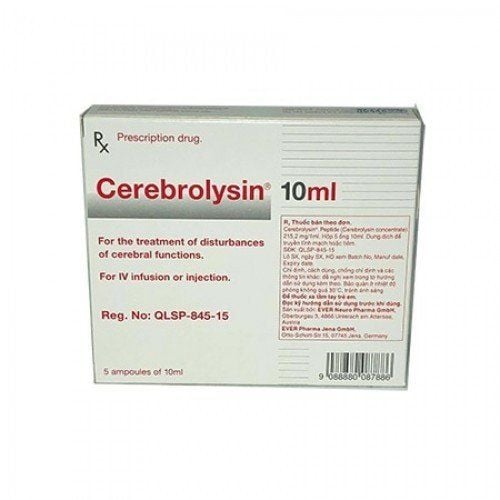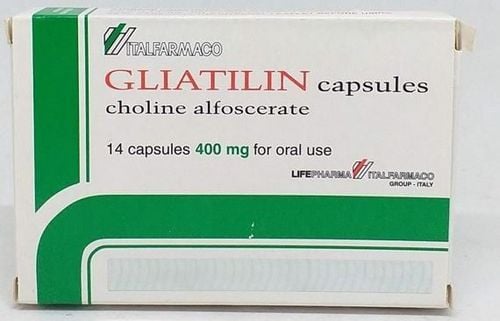Oral citicoline is used to treat Alzheimer's disease, memory loss due to multiple infarcts, traumatic brain injury, brain stroke, Parkinson's disease and different types of delayed-onset movement disorders. To better understand this medication, please refer to the following article on the composition, uses, indications, and precautions when using citicoline.
1. Indications and contraindications of Citicoline
Citicoline's main ingredient is citicoline, which stimulates the biosynthesis of phospholipids in neuronal membranes, preventing brain damage and enhancing neurotransmission. The drug increases blood flow to the brain and brain oxygen consumption through the following mechanisms:
- Citicoline acts as a precursor in the biosynthesis of phospholipids in neuronal membranes. Under the catalysis of the enzyme choline phosphotransferase, citicoline combines with diacylglycerol to form phosphatidylcholine.
- Exogenous citicoline makes a significant contribution to the choline storage system, which is essential for the synthesis of brain acetylcholine.
- Citicoline enhances neurotransmission by stimulating the release of norepinephrine, dopamine, and serotonin.
1.1. Indications for Citicoline
Citicoline is indicated in the following cases:
- Patients with acute brain diseases including: acute and subacute brain stroke such as cerebral ischemia, cerebral hemorrhage, cerebral softening, traumatic brain injury.
- Patients with chronic brain diseases, including: age-related degeneration such as Alzheimer's disease, primary degenerative dementia, multi-infarct dementia, sequelae of brain stroke, traumatic brain injury...
1.2. Contraindications of Citicoline
Citicoline is contraindicated in the following cases:
- Patients who are hypersensitive to any component of the drug.
- Increased sympathetic nervous system tone.
2. Dosage and administration
2.1. Dosage
Before using any medication, patients should consult their doctor to achieve the best results and avoid unwanted effects.
Citicoline is available in the following forms and dosages:
- Injectable: citicoline 500 mg/2 mL, 250 mg/mL
- Syrup, oral: citicoline 500 mg/5 mL, 100 mg/mL
- Oral tablets: 500 mg, 1g
Dosage of Citicoline for adults:
- Oral medication for patients with cerebrovascular disorders, cognitive impairment, Parkinson's disease, or head injury: citicoline 500mg tablets 2 times/day or 1g tablets once a day; oral solution 100-200mg 2 times/day.
- Injectable medication for patients with venous cerebrovascular disorders, acute phase of traumatic brain injury with impaired consciousness, Parkinson's disease, cognitive impairment: the average dose is citicoline 500mg-1000mg/24h intramuscular or slow intravenous injection for 3-5 minutes; or intravenous infusion at a rate of 40-60 drops/minute. Intravenous administration is usually preferred over intramuscular injection. If the patient has traumatic brain injury with sudden and persistent intracranial bleeding, only intravenous infusion up to 1000mg/24h at a rate of 30 drops/minute is allowed.
Dosage of citicoline for children:
- For children, use the oral solution at a dose of 100mg 2-3 times/day.
- Maximum treatment duration is 9-12 months.
The above dosages are recommendations from the manufacturer, and the doctor may adjust them depending on the individual patient's condition.
2.2. How to use Citicoline
Oral citicoline can be taken with or between meals. The oral solution can be used directly or mixed with 120ml of water.
Injectable citicoline should only be used under the guidance, adjustment, and monitoring of a healthcare professional. Do not self-administer at home.
The dosage is based on your health condition and response to treatment. Do not stop, take more, or take the medication more often than prescribed by your doctor.
3. Precautions when using Citicoline
Before using citicoline, you should:
- Inform your doctor if you are allergic to citicoline, acetylsalicylic acid, or any other drug.
- If you have fructose intolerance, inform your doctor.
- Inform your doctor about all the medications you are taking, including herbs and dietary supplements.
- Pregnant and breastfeeding women should not use this drug.
Citicoline is contraindicated in patients with increased parasympathetic nervous system tone. Caution should be exercised and dosage should be reduced if there is persistent intracranial bleeding.
4. Drug interactions of Citicoline
4.1. Interactions of Citicoline with the other drug
- Citicoline may affect the effectiveness of L-Dopa, so it should not be combined with medications containing meclofenoxate.
- To avoid drug interactions, it is best to list all the medications you are currently taking and consult your doctor before taking this medication.
- Although some medications should not be used together, in some cases, two medications can be used together even if there is an interaction. In these cases, your doctor may adjust the dosage or take other precautions.
4.2. Interactions Citicoline with foods or drinks
Limit the use of alcohol and tobacco as they can reduce the effectiveness of the drug and affect your health.
In conclusion, citicoline is effective in treating Alzheimer's disease, memory loss, and related problems. Medication should be taken as prescribed by your doctor for the best treatment results.
Please dial HOTLINE for more information or register for an appointment HERE. Download MyVinmec app to make appointments faster and to manage your bookings easily.













